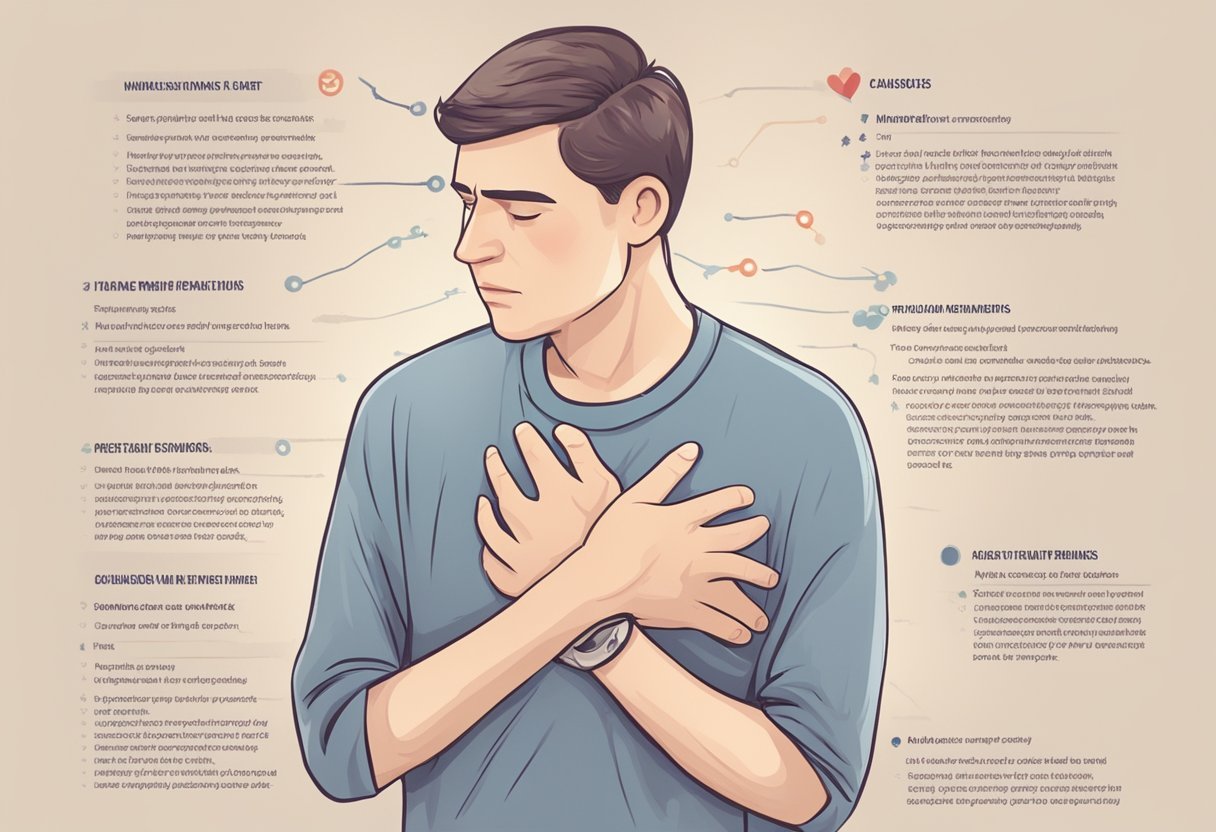Heart Palpitations
Symptoms, Causes, and Home Remedies
Discover > Health Conditions > Heart Palpitations
Heart palpitations can often be an unsettling experience, causing concern for individuals who experience them. These sensations are typically characterized by a rapid, irregular, or forceful heartbeat that may create a pounding or fluttering feeling in the chest. Understanding the symptoms, causes, and potential home remedies for heart palpitations can help individuals manage these occurrences more effectively and alleviate worry.
There are various factors that contribute to heart palpitations, including stress, anxiety, certain medications, caffeine, nicotine, and alcohol. In some cases, underlying medical conditions such as thyroid issues, anemia, or electrolyte imbalances may also be culprits. It is essential to pinpoint the cause behind the palpitations, as this will guide the appropriate approach to addressing the issue.
While many instances of heart palpitations are harmless and fleeting, it is still important to stay informed about potential home remedies that may provide relief. These can include stress reduction techniques, maintaining a well-balanced diet, and staying hydrated. For persistent heart palpitations or those accompanied by additional symptoms, it is crucial to consult with a healthcare professional for proper evaluation and guidance.
Understanding Heart Palpitations
Definitions and Descriptions
Heart palpitations refer to the sensation of an abnormal heart rhythm, causing one to feel a fluttering, pounding, or irregularity in their heartbeat. These sensations can occur in the chest, throat, or neck. Palpitations can be triggered by several factors, including stress, anxiety, medications, or medical conditions.
Common Symptoms
Fluttering: A sense of rapid and irregular heartbeats
Pounding: Feeling that the heart is beating too hard
Skipping beats: Sensation of missed heartbeats
Increased heartbeat: Faster than usual heart rhythm
Differences from Related Conditions
It is essential to distinguish heart palpitations from related conditions, as they can have different causes and treatments.
Arrhythmias: These are irregular heart rhythms that can cause similar sensations to palpitations but may require medical intervention.
Panic attacks: Psychological events that can mimic heart palpitations, causing intense fear and anxiety alongside the sensation of a pounding heart.
Heart murmurs: Harmless sounds produced by blood flow through the heart, which can sometimes be mistaken for palpitations, although they do not cause the same sensations.
In summary, understanding heart palpitations requires recognizing the common symptoms, the differences from related conditions, and the potential triggers for these sensations. Consultation with a healthcare professional is advised if you experience persistent or severe palpitations.
Causes and Triggers
Lifestyle Factors and Substances
Multiple lifestyle factors and substances can contribute to heart palpitations. Some common factors include:
Caffeine: Excess caffeine consumption can lead to increased heart rate and palpitations.
Alcohol: Heavy alcohol use may cause irregular heartbeat and palpitations.
Stimulants: Some stimulants, such as amphetamines and cocaine, can trigger palpitations.
Nicotine: Smoking or using nicotine products can also cause heart palpitations.
Medications: Certain medications, including decongestants and some asthma medications, can cause palpitations as a side effect.
Dehydration: Lack of fluid intake may lead to an imbalance of electrolytes, resulting in palpitations.
Exercise: Intense or prolonged exercise can sometimes cause palpitations in certain individuals.
Foods: Consumption of high-fat, high-sugar, or high-sodium meals may contribute to heart palpitations in some cases.
Medical Conditions Contributing to Palpitations
Several medical conditions can also contribute to heart palpitations. These may include:
Hormonal changes: Fluctuations in hormones, particularly during pregnancy, menopause, or menstruation, may cause palpitations.
Low blood sugar: Hypoglycemia, or low blood sugar, can sometimes trigger heart palpitations.
Electrolyte imbalance: Abnormal levels of electrolytes, like potassium and magnesium, may contribute to palpitations.
Heart conditions: Certain heart issues, such as arrhythmias or a history of heart disease, can increase the risk of experiencing palpitations.
Thyroid disorders: Hyperthyroidism, or an overactive thyroid, can lead to heart palpitations.
Emotional and Psychological Aspects
Emotional and psychological aspects can also play a role in triggering heart palpitations. These include:
Stress: Experiencing high-stress situations can cause a release of adrenaline, which may result in heart palpitations.
Anxiety: During moments of intense anxiety, the body's fight-or-flight response can lead to an increased heart rate and palpitations.
Panic Attacks: Episodes of panic attacks can cause a rapid heartbeat and palpitations.
In summary, heart palpitations can be triggered by various lifestyle factors, substances, medical conditions, and emotional or psychological aspects. Being aware of these triggers can help individuals take steps to prevent or manage heart palpitations.
Diagnosis and Testing
Initial Assessment
When diagnosing heart palpitations, the doctor will typically begin by gathering the patient's medical history and conducting a physical exam. This initial assessment may include questions regarding the frequency, duration, and triggers of palpitations. Other factors, such as lifestyle habits and family history of heart issues, will also be considered.
During the physical examination, the doctor will check the patient's blood pressure and listen to their heart and lungs to identify any abnormalities.
Diagnostic Tests and Procedures
If the initial assessment warrants further investigation, the doctor may recommend one or more of the following diagnostic tests and procedures:
Electrocardiogram (EKG): This is the most common test performed to diagnose heart palpitations. It records the electrical activity of the heart and can detect arrhythmias as well as other heart issues.
Blood tests: These tests can help identify potential causes of palpitations, such as anemia, thyroid disorders, or electrolyte imbalances.
Echocardiogram: This ultrasound test creates detailed images of the heart to assess its structure and function.
Chest X-ray: This imaging test can provide insight into the overall health of the heart and lungs.
Holter monitor: A portable device worn for 24 to 48 hours that continuously records the heart's electrical activity. This test is particularly useful in diagnosing intermittent or infrequent palpitations.
These diagnostic tests can be presented in a table format for clarity:
Electrocardiogram - Records heart's electrical activity to detect arrhythmias and other heart issues
Blood tests - Identifies underlying causes, such as anemia, thyroid disorders, or electrolyte imbalances
Echocardiogram - Uses ultrasound to examine heart structure and function
Chest X-ray - Assesses overall health of the heart and lungs Holter monitor Continuously records heart's electrical activity over 24 to 48 hours
Interpreting Test Results
The doctor will interpret the test results to determine the cause and severity of the heart palpitations. Based on these findings, they will recommend appropriate treatment options and, if needed, refer the patient to a specialist for further evaluation and management. In some cases, test results may be inconclusive, and additional testing or monitoring may be required to pinpoint the cause of the palpitations.
Treatment Strategies
Home Remedies and Lifestyle Adjustments
For many individuals experiencing heart palpitations, lifestyle changes and home remedies can help manage symptoms. Encouraging relaxation techniques such as meditation, yoga, tai chi, and deep breathing exercises can reduce stress and anxiety that may trigger palpitations. Performing vagal maneuvers, such as bearing down or holding one's breath, can also help stop palpitations.
Incorporating the following adjustments may provide relief:
Avoiding known triggers like caffeine, alcohol, and nicotine
Staying hydrated
Establishing and maintaining a regular sleep schedule
Eating a balanced diet rich in fruits, vegetables, whole grains, and lean protein
Medical Interventions and Prescription Medications
For some patients, addressing underlying medical issues or heart conditions is essential for managing and preventing heart palpitations. Medical professionals may prescribe medications to treat arrhythmias, such as atrial fibrillation. These may include:
Beta-blockers
Calcium channel blockers
Antiarrhythmic medications
Anticoagulants
For individuals at risk of heart disease, heart failure, or heart attack, additional medications may be recommended, including:
ACE inhibitors
Angiotensin II receptor blockers
Diuretics
Statins
It is crucial for patients to discuss their symptoms and treatment options with a healthcare professional to determine the most appropriate course of action.
Surgical Procedures and Devices
In cases where heart palpitations are due to a more severe underlying condition or do not respond to medications, surgical interventions or implantable devices may be considered. These options include:
Catheter ablation: This minimally invasive procedure uses radiofrequency energy to correct abnormal electrical pathways in the heart.
Pacemaker: A small device implanted beneath the skin to regulate the heartbeat by sending electrical signals to the heart.
Implantable cardioverter-defibrillator (ICD): A device that monitors heart rhythms and delivers electrical shocks if a dangerously irregular heartbeat is detected.
Cardiac surgery: In rare cases, open-heart surgery may be necessary to repair structural abnormalities in the heart.
Choosing the proper treatment strategy for heart palpitations will vary depending on each individual's specific situation, symptoms, and underlying conditions. Consulting with a healthcare professional can ensure that the most effective approach is taken.
Preventing Future Episodes
Understanding and Avoiding Triggers
To prevent heart palpitations, it is essential to understand and avoid factors that trigger the condition. Common triggers include anxiety, anemia, hyperthyroidism, menopause, and certain medications. Make a list of possible triggers and take note of potential warning signs.
Practical steps to avoid triggers:
Relaxation: Practicing relaxation techniques, such as deep breathing, meditation, or yoga, can help reduce anxiety and stress.
Minimize stimulants: Limit caffeine, alcohol, and nicotine consumption.
Strenuous exercise: Gradually increase intensity and duration of physical activities to avoid overexertion.
Stay hydrated: Dehydration can affect heart rhythm, so drink sufficient water.
Managing Underlying Heart Conditions
For patients with an existing heart condition, maintaining regular checkups and follow-up care can help prevent future episodes of heart palpitations. Doctors might perform a physical exam or recommend monitoring devices to assess heart rhythm. Proper management of underlying medical conditions, such as anemia, hyperthyroidism, or menopause, can help prevent palpitations as well.
Recommended actions:
Participate in routine medical checkups.
Adhere to prescribed medications and treatment plans.
Stay vigilant for potential signs of heart conditions, such as chest pain or shortness of breath.
Long-term Lifestyle Considerations
Adopting a healthier lifestyle can contribute to the prevention of heart palpitations. Focus on maintaining a balanced diet, regular exercise, and weight management. Control stress and prioritize a good night's sleep.
Key lifestyle changes include:
Diet: Incorporate heart-healthy foods, such as fruits, vegetables, whole grains, and lean proteins.
Exercise: Engage in moderate aerobic activities for at least 150 minutes per week.
Stress management: Avoid or reduce exposure to stressors, and practice relaxation techniques.
Sleep: Aim for 7-9 hours of quality sleep each night.
In summary, understanding and avoiding triggers, managing underlying heart conditions, and implementing long-term lifestyle changes can help prevent future heart palpitation episodes. Regular monitoring and adherence to medical advice are crucial for maintaining overall heart health.
When to Consult a Doctor
Symptoms Warranting Medical Attention
Although occasional heart palpitations can be harmless, it is crucial to seek medical attention if they are accompanied by fainting, dizziness, severe pain in the chest, or shortness of breath. These symptoms may indicate a more severe underlying issue that requires immediate evaluation by a doctor or cardiologist.
Regular Health Check-ups and Monitoring
Heart palpitations can sometimes signal an underlying cardiac condition. Thus, it is essential to have regular health check-ups and discuss any palpitations with your healthcare provider. If you have a history of smoking or other risk factors, your practitioner may recommend routine monitoring or specific procedures, such as an electrocardiogram (ECG) or the use of a heart monitoring device.
Asking the Right Questions
When speaking with your doctor about heart palpitations, be prepared to ask relevant questions to better understand the potential causes and treatments. A few examples of questions to consider include:
Could stress or anxiety be the cause of my palpitations?
Are any of my medications contributing to the palpitations?
Are there specific triggers I should avoid to reduce the frequency of these episodes?
What lifestyle changes or home remedies can help manage my palpitations?
Remember, heart palpitations occurring alongside symptoms like chest pain, shortness of breath, fainting, or dizziness should never be ignored. Always consult with your healthcare provider for proper evaluation and management of these symptoms.
Conclusion
Key Takeaways
Heart palpitations can be caused by a wide range of factors, including stress, lack of rest, vigorous activity, and certain medications. Common causes of palpitations are atrial fibrillation, abnormal heart rhythm, and tachycardia. The vagus nerve, blood sugar levels, and certain physical positions, such as the neck being bent, can also contribute to palpitations.
Some factors may increase the likelihood of experiencing palpitations during pregnancy, such as changes in electrolyte levels (potassium, calcium, magnesium, and sodium). Maintaining proper electrolyte levels through a balanced diet or supplements can help reduce palpitations. Additionally, individuals should be cautious of taking cold and cough medications, as they may trigger heart palpitations.
Substances like cocaine and amphetamines can lead to racing heartbeats and pose serious risks to overall health. It is crucial to stay away from such substances to protect heart health.
Encouragement for Ongoing Awareness
It is essential for individuals to monitor their heart health by paying attention to their symptoms, especially if they experience palpitations regularly. Keeping a log of activities and possible triggers can be beneficial in identifying patterns and managing symptoms.
If palpitations persist or become more frequent, consulting a medical professional is crucial to receive the necessary assistance. Early detection of any underlying condition, such as atrial fibrillation, can help to prevent further complications and ensure appropriate treatment.
In conclusion, awareness, proper self-care, and seeking professional assistance in case of persistent or worsening symptoms are key to managing heart palpitations and maintaining overall heart health.
#chest pain unusual sweating #abnormal heart valve #significant risk factors #own heartbeat #high blood pressure #unusual heartbeat sensations #palpitations occur #abnormal heart rhythms





